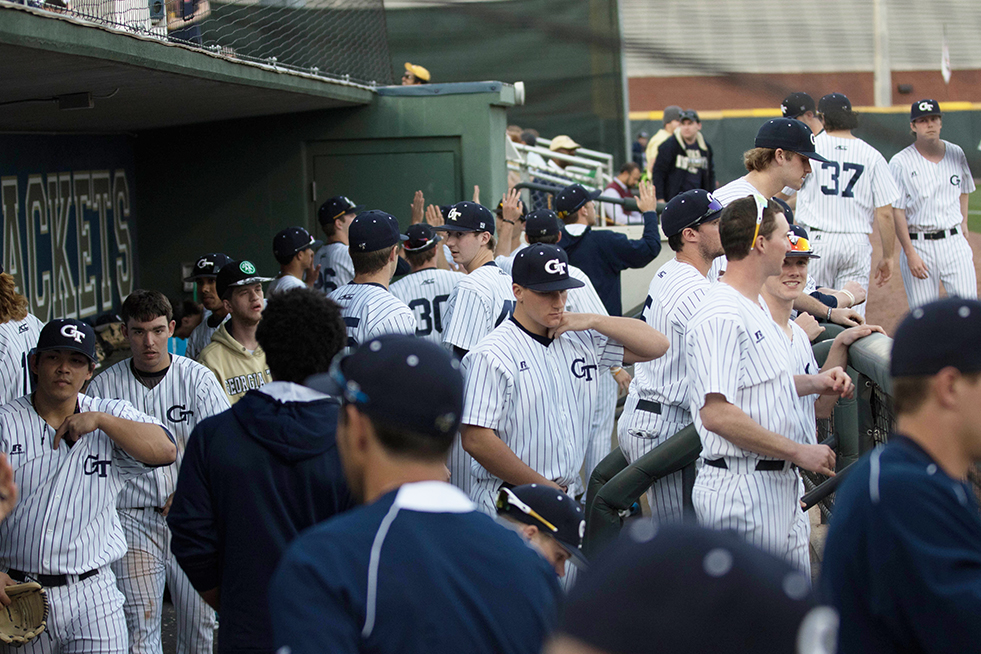Winning their first six games and nine of their first 10, Tech baseball looked poised for a strong campaign. There were questions about the rotation’s depth, but those issues seemed ill-founded.
As of late, though, doubts have surfaced. The Jackets have dropped to 14-9, including a measly 3-6 in ACC games. Yet despite the slump, individual performers have shown significant promise.
Bart Goes Deep
Catcher Joey Bart has been one of the most valuable players on the team at this point in the season. Bart is batting .374, has 29 RBIs and 11 home runs. That last figure puts Bart in the team lead. Against Mercer, he notched two more home runs to put him in a tie for second nationally. On the day, he went a perfect five for five at the plate with the two home runs and five RBIs. His contributions helped lead to Tech’s convincing 11-3 win against Mercer.
Already on watch for the Johnny Bench Award, Bart’s hot bat cannot be understated. A well-rounded catcher is hard to find, and Bart is shaping up a player of that caliber.
Bart’s contributions will be especially crucial if the pitching rotation does not solidify its performance and Tech is forced to put together high-scoring outings to earn wins. So far, Bart has been performing well, but one hitter cannot carry always carry a team to victory.
Fast Starts Are Key
43.18 percent of Tech’s runs have been scored in the first three innings of the game. They have scored 27, 23 and 26 runs in the first, second and third innings, respectively. The Jackets are 5-0 when taking a lead at the end of the first inning, 8-1 when leading after the second inning and 11-1 when leading after three innings.
The fact that the Jackets have such a stellar record in these situations and a mediocre one overall shows that they have faced more than their fair share of early shellings, thanks in part to the quality of opposing batting and thanks in part to the inconsistency of Tech pitching so far.
In a typical game, the starting pitcher will get through all 9 hitters in the lineup sometime in the third inning. When an offense succeeds in the first three innings, it puts additional pressure on the pitcher to adjust. If Tech can continue to come out to fast starts, their winning ways will continue.
The First Five
Despite inconsistency from Tech’s arms, they have been instrumental in earning wins. A majority (11 of 14) of Tech’s wins can be attributed to effective pitching. Particularly in the first five innings of each game, Tech gives up an average of just 3.13 runs in the first five innings. Starting pitchers usually pitch for the first five innings of each game on a good day in college baseball, and Tech’s have put in some quality efforts.
The bullpen is slightly less settled. 68 of opponents’ 145 runs against Tech this season have come in the sixth inning or later. That will need to change in order for the team to pull out more close wins (and avoid blowouts that are a result of poor pitching.)
Jay Shadday (2.50), Ben Schniederjans (2.79), Ben Parr (3.12), Jonathan Hughes (3.32)and Xzavion Curry (4.60) have all started games for Tech this year and have good ERAs.
Datoc Shows Progress
As a freshman and sophomore, Jared Datoc made 19 appearances over 16.4 innings as a relief pitcher. This season he has already appeared in 14 games and has pitched 24.1 innings. Datoc also has 27 strikeouts, second only to Xzavion Curry (31) on the team. Extrapolated to a K/9 ratio, Datoc is recording 5.25 strikeouts for every nine innings he pitches. As Datoc makes longer appearances in relief, he continues to demonstrate his effective nature.
If he continues his solid pitching, it is fair to assume that he may be in competition for an opportunity to start games next season. In the meantime, the righty is a reliable option in the bullpen whom Coach Hall can call during key situations in close contests.
The .300 Club
Twenty-three games into the season, Austin Wilhite (.377), Joey Bart (.374), Trevor Craport (.354), Wade Bailey (.352) and Coleman Poje (.329) are all batting over the coveted .300 mark. Bart, Craport and Bailey are everyday starters in the lineup, and Wilhite has started 22 of 23 games this season while making an appearance in the one he didn’t start in. Poje entered the season expecting to start every few games, but his consistent hitting has provided him with the opportunity to start 19 out of 23 possible games while making an appearance in all 23.
Batting averages over .300 show more than mere power or placement. They demonstrate patience at the plate, a willingness to wait for the right pitch. Tech will need to continue maximizing the value of its at-bats if it is to go about bettering (and perhaps soon evening) its conference record.
